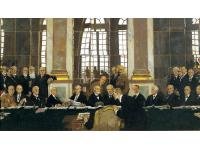The Complex Legacy of War Reparations
War reparations have long been a contentious issue in international relations, often leaving a profound impact on both the payer and the recipient. The concept involves compensating a victorious nation by the defeated for the damage and loss caused during a conflict. One of the most famous and impactful instances of war reparations is the aftermath of World War I, particularly the reparations imposed on Germany by the Treaty of Versailles. These reparations not only had significant economic implications but also contributed to political and social upheaval, setting the stage for future conflicts.

Origins and Objectives of Reparations
The primary objective of war reparations is to make amends for the destruction and suffering caused during a conflict. In theory, these payments are meant to rebuild the affected areas and compensate victims. However, in practice, reparations often serve as a means for the victorious nations to assert dominance and punish the defeated. This dual purpose can lead to significant tension and resentment, complicating the post-war recovery process.
After World War I, the Allied Powers—primarily France, Britain, and the United States—demanded substantial reparations from Germany. The Treaty of Versailles, signed in 1919, placed full responsibility for the war on Germany and its allies, thereby justifying the imposition of heavy reparations. The exact amount was set at 132 billion gold marks, a sum that was astronomical for the time and placed an immense burden on the German economy.
Economic Impact on Germany
The economic impact of these reparations on Germany was profound and far-reaching. To meet the reparation payments, the German government resorted to printing more money, leading to hyperinflation. By the early 1920s, the value of the German mark had plummeted, causing prices to skyrocket and eroding the savings of ordinary Germans. This hyperinflation crisis wiped out the middle class's wealth, leading to widespread poverty and social unrest.
Moreover, the reparations payments drained Germany's resources, hampering its ability to invest in economic recovery and industrial rebuilding. Unemployment soared, and the country struggled with crippling debt. The economic hardships faced by the German population created fertile ground for political extremism, as desperate citizens sought solutions to their plight. This environment contributed significantly to the rise of Adolf Hitler and the Nazi Party, who promised to restore Germany's former glory and overturn the Treaty of Versailles.
Political and Social Repercussions
The political and social repercussions of the reparations were equally significant. Many Germans viewed the Treaty of Versailles as a "Diktat"—an imposed settlement that humiliated their nation. This sense of injustice and betrayal undermined the legitimacy of the Weimar Republic, the democratic government established in Germany after the war. The republic was seen as weak and complicit in the humiliation, leading to political instability and frequent changes in government.
The widespread discontent and economic misery also fueled radical political movements. Both the far-left, represented by the Communists, and the far-right, led by the Nazis, gained traction by promising to address the economic woes and restore national pride. The Nazis, in particular, were adept at exploiting the grievances associated with the reparations and the broader terms of the Treaty of Versailles, using them as rallying points to garner support.
International Response and Adjustments
The international response to the reparations issue evolved over time. Initially, the Allied Powers were adamant about the need for Germany to pay the full amount. However, as the economic situation in Germany deteriorated and the potential for instability became apparent, there was a gradual shift in attitude. The Dawes Plan of 1924 and the Young Plan of 1929 were efforts to restructure and reduce Germany's reparation payments to make them more manageable.
The Dawes Plan involved loans from the United States to stabilize the German economy and facilitate reparation payments. The Young Plan further reduced the total amount of reparations and extended the payment period. Despite these adjustments, the reparations continued to be a source of contention and a burden on the German economy.
Lessons and Legacy
The legacy of war reparations, particularly those imposed on Germany after World War I, offers important lessons for contemporary international relations. Excessive and punitive reparations can have unintended consequences, including economic collapse, political instability, and the rise of extremist movements. The experience of Germany highlights the need for a balanced approach to post-war settlements that promotes recovery and reconciliation rather than punishment and humiliation.
In the broader context, the issue of reparations underscores the importance of addressing the root causes of conflict and fostering cooperation and understanding among nations. While reparations may provide a sense of justice and compensation, they should be carefully calibrated to avoid exacerbating tensions and creating conditions for future conflicts. The lessons learned from the Treaty of Versailles and its aftermath continue to inform discussions on how to achieve lasting peace and stability in the aftermath of war.







